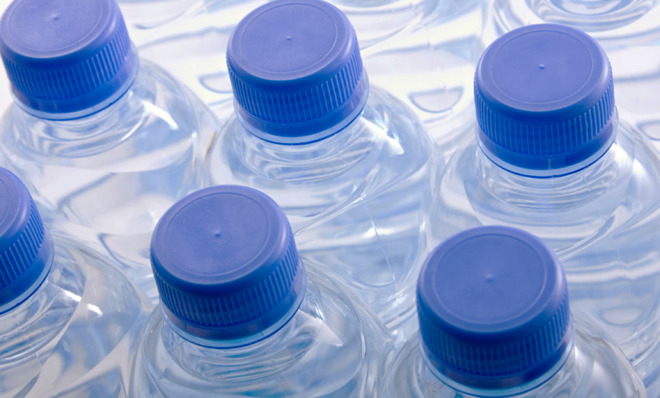You know what deserves a big, fat tax? Bottled water.
The Highway Trust Fund needs a new source of revenue. And the transport of bottled water is both wasteful and unnecessary.


A free daily email with the biggest news stories of the day – and the best features from TheWeek.com
You are now subscribed
Your newsletter sign-up was successful
Everyone agrees that the Highway Trust Fund, which is used to repair and maintain our roads and bridges, is in deep financial trouble. But beyond that, opinions for how to keep the fund solvent are as abundant as the roads at an L.A. interchange.
For progressives, the debate has focused on how to wring more money out of our cars without actually raising the gas tax, such as a proposal for a new tax on vehicle miles traveled. Some conservatives, meanwhile, have seized the opportunity to question why we have a federal gas tax at all.
But what if the solution is sitting on your desk right in front of you?
The Week
Escape your echo chamber. Get the facts behind the news, plus analysis from multiple perspectives.

Sign up for The Week's Free Newsletters
From our morning news briefing to a weekly Good News Newsletter, get the best of The Week delivered directly to your inbox.
From our morning news briefing to a weekly Good News Newsletter, get the best of The Week delivered directly to your inbox.
That would be bottled water, of which Americans consumed nearly 10 billion gallons in 2012 alone.
Bottled water's problems are already well known, even among those who might buy one on occasion. For starters, it's many thousands of times more expensive than tap water. To put the cost in perspective, you could turn on your faucet at nine in the morning, turn it off at five in the evening, and still have spent less than if you bought a 500-milliliter bottle of imported spring water.
Fair enough, you say. But what does bottled water have to do with the Highway Trust Fund?
In fact, bottled water arguably does far more harm to our nation's infrastructure pound-for-pound than any automobile.
A free daily email with the biggest news stories of the day – and the best features from TheWeek.com
That's because bottled water is tremendously wasteful to transport. Our municipal water companies have already invented a perfectly good way to move H2O from the source to the reservoir to our homes and offices: the networks of aqueducts and pipelines that run under our streets.
But because bottled water is just that — bottled — it can't be delivered nearly as efficiently. Instead, legions of exhaust-belching trucks crisscross our country every day, taking up room on our highways and city streets that should rightly go to products (or people) that can't be put in a pipeline. Moreover, water is denser than many other consumer products, meaning these trucks weighed down with Dasani do even more damage to our roads and bridges than if they were carrying something else.
When we think realistically about how to fix our nation's infrastructure, we need a more nuanced approach. Rather than seeing cars and trucks as the problem per se, let's raise money to repair our roads and bridges by targeting the product that least deserves to use them.
To be effective, the penalty wouldn't even need to be severe. Last year, the federal government raised about $25 billion from the gas tax. If we wanted to raise the same amount from bottled water, a federal excise tax would add less than 50 cents to the price of a 500-milliliter bottle of Fiji or Poland Spring. In national emergencies — the one time people actually need bottled water — the tax could be suspended.
Part of the money raised should then go to replenishing the Highway Trust Fund, in essence charging people for using a product that needlessly harms our roads when there's perfectly good water in their faucet.
In the same vein, a large portion of the revenue could be used to prop up the EPA's Drinking Water State Revolving Fund Program, which helps states and municipalities provide clean drinking water through improvements to local water systems. Three years ago, program officials found that those systems will need $384 billion in funding over the next two decades, but the program currently awards states a combined total of less than $1 billion per year.
This is the budget shortfall that we're currently seeing play out in Detroit, where the city's water company cut service to nearly 8,000 customers in April and May. Local officials admitted that the city's antiquated system means they can't track how much water is leaking, or even which properties are vacant and should be prioritized for service cuts.
Bottled water didn't cause Detroit's problems, but it is part of a culture in which it's okay to leave municipal water systems high and dry while we let bottled water use our roads for free.
Millions of commuters need to use those roads every day. The water we drink does not.
Jacob Anbinder is a policy associate at the Century Foundation, the New York-based think tank. He writes about transportation, infrastructure, and urban affairs.
-
 5 cinematic cartoons about Bezos betting big on 'Melania'
5 cinematic cartoons about Bezos betting big on 'Melania'Cartoons Artists take on a girlboss, a fetching newspaper, and more
-
 The fall of the generals: China’s military purge
The fall of the generals: China’s military purgeIn the Spotlight Xi Jinping’s extraordinary removal of senior general proves that no-one is safe from anti-corruption drive that has investigated millions
-
 Why the Gorton and Denton by-election is a ‘Frankenstein’s monster’
Why the Gorton and Denton by-election is a ‘Frankenstein’s monster’Talking Point Reform and the Greens have the Labour seat in their sights, but the constituency’s complex demographics make messaging tricky
